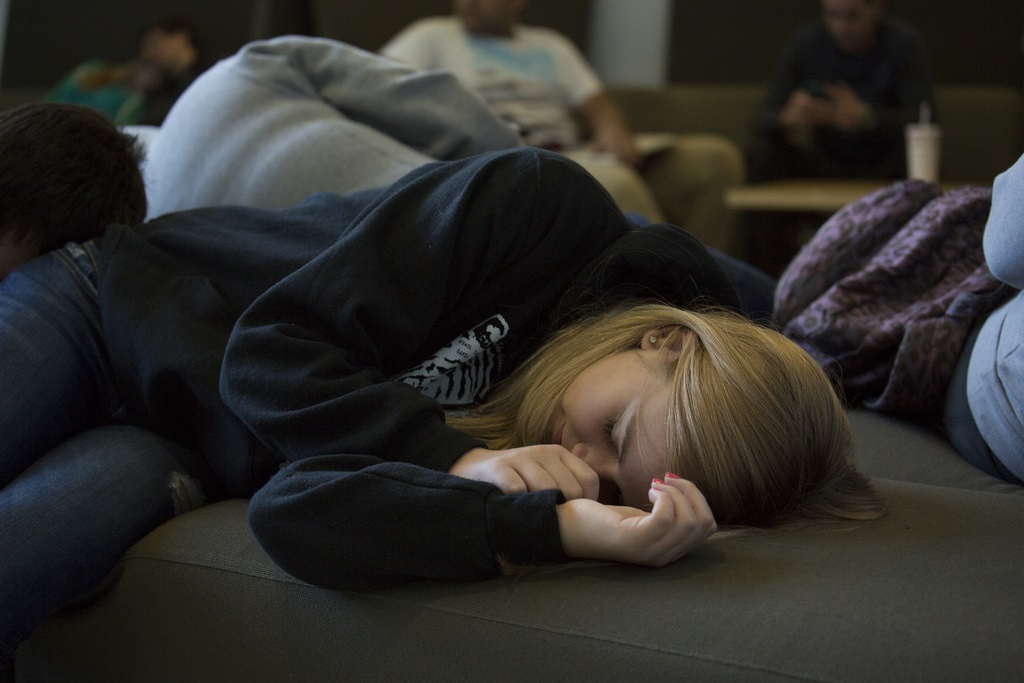In a first period classroom, the teacher is usually the most bright and energetic out of all the people in the room. He/she looks across a classroom of thirty or so sleep-deprived, exhausted students on the verge of a nap attack.
Students walk into class mentally and physically drained from either the early wake up time, going to bed late, distracted from being on their phones at night, or all three.
Leesville’s first period classes begin at 7:25 A.M. sharp. For the large amount of students in the school, this is the time that begins an extraneous long day on campus. As the nearly seven hour school day drags on, students become noticeably worn out before they are dismissed.
Students then go home to do their usual after-school routine, which differs for every student. Gabrielle Thonglert, sophomore, explains her routine: “I am a perfectionist as student.. I organize, first with math, then practice my instrument, shower, etc., ” said Thonglert.
Thonglert’s free time consists of more schoolwork and studying each weeknight. Much of her studying carries over into the weekend. “I’m normally in bed around 10:30, and 11 on later nights. But if I’m extra unlucky, I may just get into bed around 2,” said Thonglert.
Though homework is a big priority for students, for some, extracurricular activities are their main focus. Sports, dancing, theatre, and even internships are some of the things that keep students away from completing their schoolwork until late at night.
Just ask Zayne Naseer, junior and Leesville varsity football player, how hectic his homework life is after practice 4 days a week and a game every Friday: “[As a football player] we used to get out around 6:30 or 7, but recently the time has been cut back to closer to 6. But homework and any other projects takes a while throughout the week sometimes keeping me up until 10 or 11 at night,” said Naseer.
Naseer doe not start his homework directly, due to other in the house needs such as showering. He spends at least an hour on homework from each of his classes before he goes to bed for the night.
“To cut down on the time spent at home I usually go in for SMART lunch at least 3-4 days out of the 5 days in the week to do work.. I rarely get free time in the week,” said Naseer.
Bedtimes vary between student. For those who do not have many activities outside of school, an early bedtime for them provides enough energy for the next day.For the majority of students, bedtimes are very inconsistent and hard to keep up with, resulting in tired mornings.
According to nationwidechildrens.org, teenagers need about 9 to 9 ½ hours of sleep a night to function well in the classroom each day. However, teenagers in today’s environment average only 7 to 7 ½ hours of sleep a night, and sometimes even lower than that amount.
Though every student has a different schedule, the practice of taking a short power nap may save some students from missing out in the classroom due to how tired they are.
Studies from sleepfoundation.org show that just a quick power nap of 15-30 minutes increases short term awareness, enough to keep one alert for the rest of the day to complete all school responsibilities.
Naps, if done right, will have little effect on the person’s sleep schedule when they prepare to enter their nightly sleep cycle.
When the physical and mental fatigue students endure during the day sets in, a fast nap can hit the reset button on their alertness and bring back up mental stamina to complete the rest of their day.What many have to watch out for is longer naps. Naps that are 30 minutes or longer will most likely result in sleep inertia, the state of grogginess one feels when awakening from a deep, long sleep.
The grogginess only lasts a short period of time, but its effects may have the person who took a nap to re-energize feel more exhausted than they did when they hit the bed. Timing is the key element of a successful napping session.
Though naps are an effective way of a person to recharge, some students may not have the opportunity to lie down and doze off for a bit, due to things such as sports or other obligated responsibilities.
If this is the case, performing an action something as simple as standing up and moving around for a little bit gets the body alert and focused. As blood flows, the body stays awake and feels energized. However, naps are a highly beneficial solution to fixing tiredness during the day. Students however, should not find this as an excuse to sleep in class.. They might miss something they wish they didn’t.

Leave a Reply